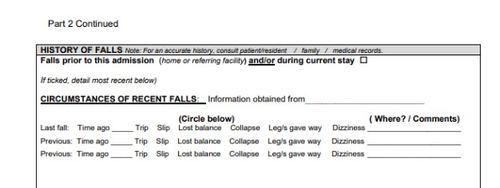The Only Guide to Dementia Fall Risk
The Only Guide to Dementia Fall Risk
Blog Article
What Does Dementia Fall Risk Mean?
Table of ContentsFascination About Dementia Fall RiskGetting My Dementia Fall Risk To WorkUnknown Facts About Dementia Fall RiskGetting The Dementia Fall Risk To Work
An autumn danger evaluation checks to see how likely it is that you will certainly fall. The assessment normally includes: This includes a series of inquiries about your overall wellness and if you've had previous drops or issues with balance, standing, and/or walking.Interventions are recommendations that may lower your threat of dropping. STEADI includes three steps: you for your danger of dropping for your risk elements that can be enhanced to attempt to avoid drops (for example, equilibrium problems, impaired vision) to reduce your risk of dropping by utilizing effective methods (for example, giving education and learning and resources), you may be asked numerous concerns including: Have you fallen in the previous year? Are you fretted concerning dropping?
If it takes you 12 secs or more, it might indicate you are at greater threat for a fall. This examination checks toughness and equilibrium.
Relocate one foot halfway ahead, so the instep is touching the large toe of your other foot. Move one foot fully in front of the various other, so the toes are touching the heel of your other foot.
A Biased View of Dementia Fall Risk
Most falls occur as a result of several adding elements; for that reason, taking care of the risk of falling starts with identifying the aspects that contribute to fall threat - Dementia Fall Risk. Some of one of the most relevant risk elements consist of: History of prior fallsChronic medical conditionsAcute illnessImpaired gait and equilibrium, lower extremity weaknessCognitive impairmentChanges in visionCertain risky medicines and polypharmacyEnvironmental factors can likewise boost the danger for falls, including: Inadequate lightingUneven or damaged flooringWet or slippery floorsMissing or harmed handrails and grab barsDamaged or incorrectly equipped equipment, such as beds, wheelchairs, or walkersImproper use assistive devicesInadequate supervision of individuals residing in the NF, consisting of those who exhibit hostile behaviorsA effective loss threat management program calls for a comprehensive clinical assessment, with input from all participants of the interdisciplinary group

The treatment plan ought to also consist of interventions that are system-based, such as those that promote a safe setting (proper illumination, handrails, get bars, etc). The performance of the interventions ought to be assessed occasionally, and the treatment strategy revised as essential to mirror modifications in the autumn danger evaluation. Executing a fall threat monitoring system making use of evidence-based best practice can decrease the prevalence of falls in the NF, while restricting the potential for fall-related injuries.
The smart Trick of Dementia Fall Risk That Nobody is Talking About
The AGS/BGS standard advises screening all adults aged 65 years and older for loss danger annually. This screening includes asking individuals whether they have dropped 2 or even more times in the past year or sought clinical attention for an autumn, or, if they have not fallen, whether they feel unsteady when walking.
People who have actually dropped once without injury needs to Extra resources have their equilibrium and gait reviewed; those with gait or balance irregularities must obtain added evaluation. A history of 1 fall without injury and without gait or equilibrium troubles does not necessitate more analysis beyond continued annual fall risk testing. Dementia Fall Risk. An autumn risk evaluation is required as component of the Welcome to Medicare assessment

All about Dementia Fall Risk
Recording a drops background is one of the quality indications for autumn avoidance and monitoring. A vital component of danger evaluation is a medicine review. Numerous classes of medications raise loss risk (Table 2). copyright medicines particularly are independent predictors of drops. These medications tend to be sedating, change the sensorium, and hinder equilibrium and stride.
Postural hypotension can frequently be minimized by decreasing the dosage of blood pressurelowering medicines and/or quiting medications that have orthostatic hypotension as an adverse effects. Use above-the-knee assistance hose and copulating the head of the bed raised might additionally lower postural reductions in high blood pressure. The suggested aspects of a fall-focused physical exam are revealed in Box 1.

A Yank time greater than or equivalent to 12 secs suggests high loss danger. Being unable to stand up from a chair of knee elevation without utilizing blog one's arms indicates raised autumn risk.
Report this page